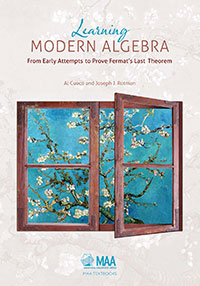Sol Lederman of Wild About Math interviewed Al Cuoco on his latest book Learning Modern Algebra: From Early Attempts to Prove Fermat's Last Theorem (co-author Joseph Rotman).
Listen to the interview here.
Learning Modern Algebra: From Early Attempts to Prove Fermat's Last Theorem
by Al Cuoco and Joseph Rotman
This
book is designed for prospective and practicing high school mathematics
teachers, but it can serve as a text for standard abstract algebra
courses as well. The presentation is organized historically: the
Babylonians introduced Pythagorean triples to teach the Pythagorean
theorem; these were classified by Diophantus, and eventually this led
Fermat to conjecture his Last Theorem. The text shows how much of modern
algebra arose in attempts to prove this; it also shows how other
important themes in algebra arose from questions related to teaching.
Indeed, modern algebra is a very useful tool for teachers, with deep
connections to the actual content of high school mathematics, as well as
to the mathematics teachers use in their profession that doesn't
necessarily "end up on the blackboard."
Showing posts with label Al Cuoco. Show all posts
Showing posts with label Al Cuoco. Show all posts
Friday, June 27, 2014
Friday, August 30, 2013
MAA Review of Learning Modern Algebra
 Mark Hunacek reviews Learning Modern Algebra by Al Cuoco and Joseph J. Rotman as part of MAA Reviews. Mark Hunacek reviews Learning Modern Algebra by Al Cuoco and Joseph J. Rotman as part of MAA Reviews.This is an interesting, well-written book, in search of an appropriate course in which it could be used as a text. From the title, one would think that it was intended primarily as a text for an introductory abstract algebra course, but using it that way would require a fairly radical overhaul of the traditional syllabus of such a course. This is intentional: the authors make clear in the Preface to the book that they believe that this traditional syllabus (namely number theory, followed by groups and then rings) to be not only “totally inadequate for future teachers of high school mathematics” but also “unsatisfying for other mathematics students” as well. They propose that abstract algebra should be taught in two semesters: number theory and rings in the first, groups and linear algebra in the second. Even for such a course, however, this book would likely not be appropriate for both semesters; it covers a lot of number theory and ring theory, but very little group theory and linear algebra. (More about the specific contents later.) The primary intended audience of the book is future high school teachers. The authors take great pains to relate the material covered here to subjects that are taught in high school mathematics classes. And not just high school algebra classes: there is, for example, a fairly lengthy and quite detailed section on straightedge and compass constructions, including statements and (at least partial, and often full) proofs of many sophisticated results regarding impossible constructions. Read the full review here.
To order your copy today, visit the MAA Store or the MAA eBooks Store.
|
Subscribe to:
Posts (Atom)
